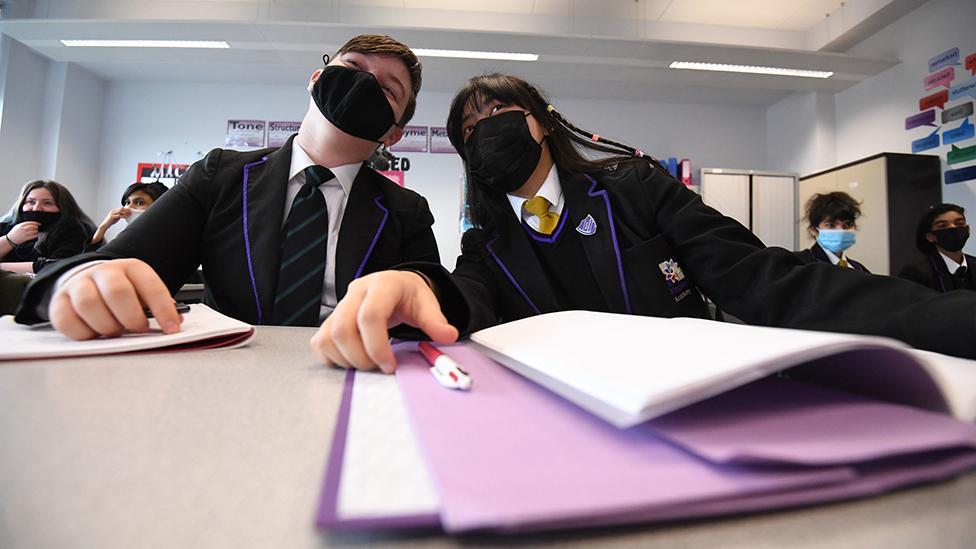Coronavirus: Gavin Williamson seeks to reassure parents over school plan
- Published
- comments
"This is a very small, tentative step, in what I believe is the right direction," Mr Williamson tells BBC's Branwen Jeffreys
Education Secretary Gavin Williamson has said "we owe it to the children" to get pupils back in school, as he reassured parents it would be safe.
Mr Williamson said he knew some parents were "very anxious" about reopening schools, but said it would be a "cautious, phased return".
It follows a row over the government's plan to begin a phased reopening of schools in England from 1 June.
Teachers' unions have said the date is too soon to be safe.
Speaking at the government's daily Downing Street briefing on Saturday, Mr Williamson said: "There are some who would like to delay the wider opening of schools but there is a consequence to this.
"The longer that schools are closed the more children miss out. Teachers know this. Teachers know that there are children out there that have not spoken or played with another child of their own age for two months.
"They know there are children from difficult or very unhappy homes for whom school is the happiest moment in their week and it's also the safest place for them to be."
England is the only UK nation to set a date for schools to start to reopen. Schools in Wales will not reopen on 1 June, while those in Scotland and Northern Ireland may not restart before the summer holidays.
Meanwhile, the number of people who have died with coronavirus in the UK has increased by 468, the government said on Saturday., external It takes the total number of UK deaths, in all settings following a positive coronavirus test, to 34,466.
Schools in England closed for most pupils on 20 March, staying open only for the children of key workers and vulnerable children.
The phased reopening will begin with children in nursery and pre-school, Reception and Years 1 and 6 returning to primary school first on 1 June. At secondary school and college, Years 10 and 12 would return first.
But teaching unions have said plans to reopen primary schools do not have adequate safety measures and need to be halted. Some councils have said their schools will not open.
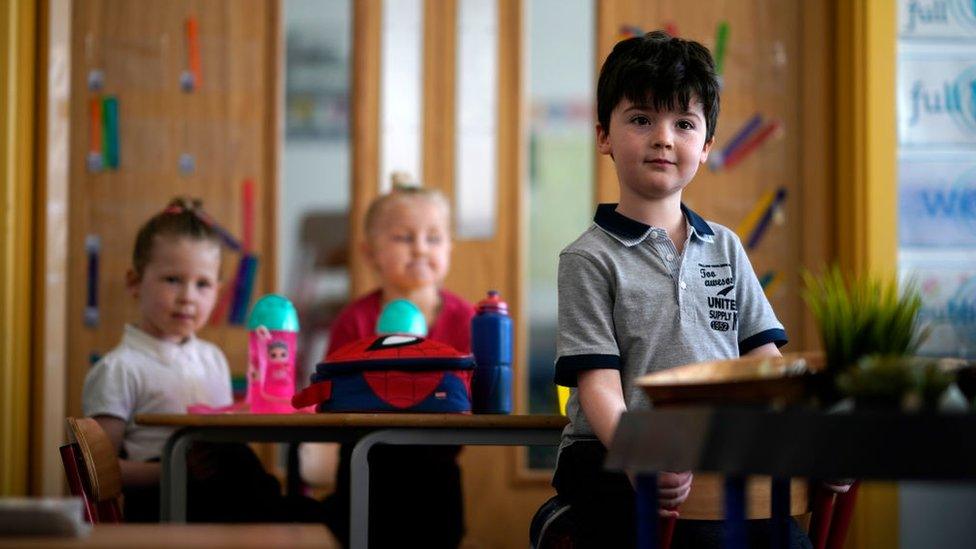
Education is "one of the most important and precious gifts" for a child, Mr Williamson said
Mr Williamson said the government's approach was based on the "best scientific advice with children at the very heart of everything we do" - and the impact of it would be carefully monitored.
"We have been quite clear all along that we'd only start inviting more children when our five key tests have been met," he said. "That position has not changed nor will it."
The education secretary also said students in Years 10 and 12 who were studying for their GCSEs and A-levels "stand to lose more by staying away from school".
But there were no plans to bring forward the start of the next school year to August, he said - although he was looking at "different initiatives" which could be rolled out during the summer.
Teenagers in limbo as coronavirus halts exams
Reassuring people what safety measures were being taken, Mr Williamson said school staff could already be tested for the virus and, from 1 June, children and their families would also be able to get tests if they developed symptoms.
Pupils will also be kept in groups of no more than 15 and there will be regular cleaning, Mr Williamson added.
"Together these measures will create an inherently safer system where the risk of transmission is substantially reduced for children, their teachers and also their families," he said.
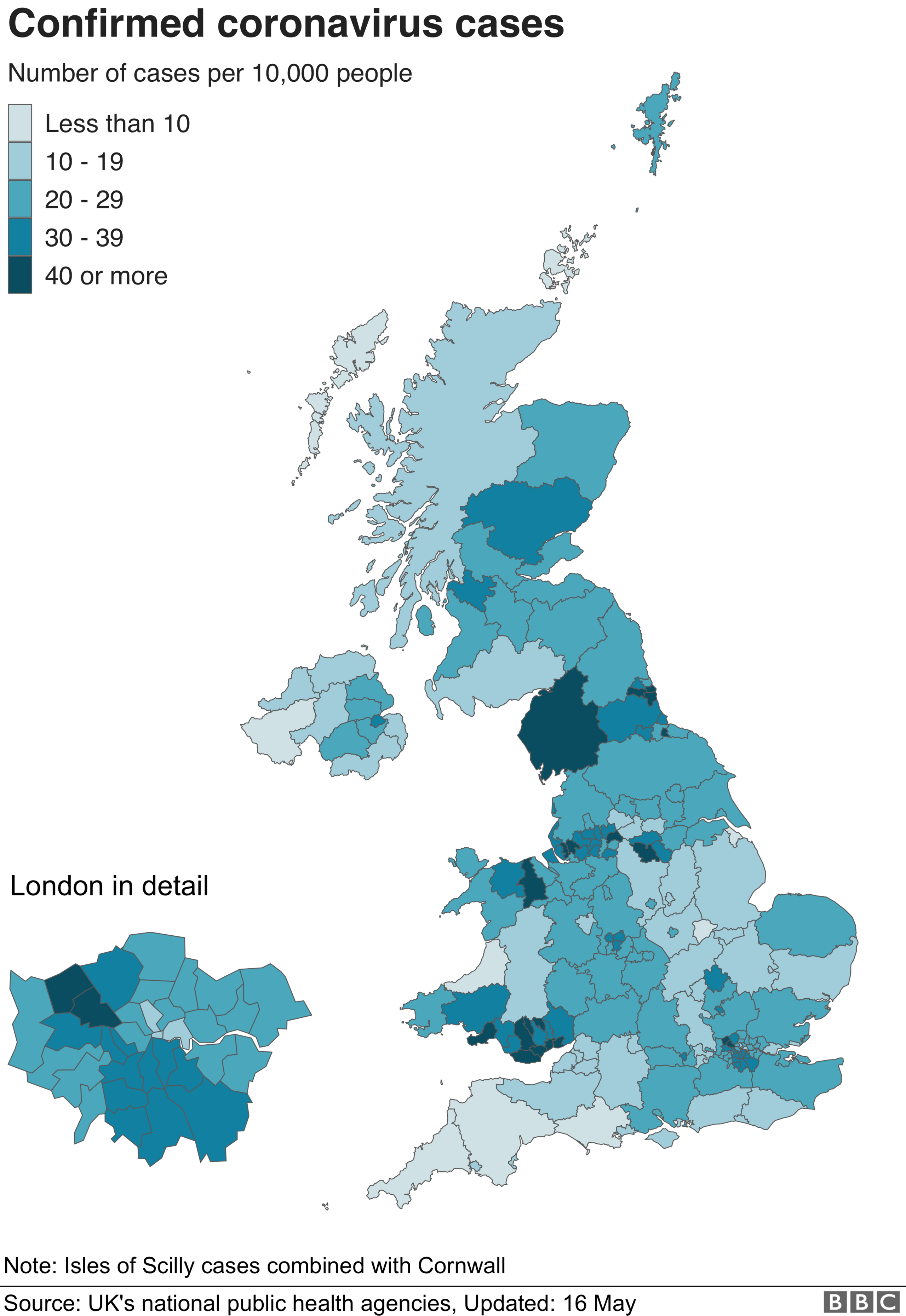
There were 136,486 tests in the UK on Friday - the highest daily figure so far in the UK. Boris Johnson has set a target of 200,000 tests a day by the end of May.
Dr Jenny Harries, England's deputy chief medical officer, told the briefing that evidence suggests children "probably have [the] same level of infections" but do not get as ill with the virus.
Parents and teachers "should not be thinking that every school is swarming with cases," she said.

Will infections rise?
By BBC health reporter Rachel Schraer
Will some children in England returning to school lead to an increase in infections? This is being debated by politicians, teachers and unions.
Dr Jenny Harries said that seven different "return to school" scenarios had been modelled by the government's Scientific Advisory Group for Emergencies (Sage).
She said the government had adopted one scientists estimate will give the smallest increase in the R number - the measure of how fast the disease the is spreading.
In England, Reception, Year 1 and Year 6 children will return to school from 1 June.
Some of the reasons given for picking these age groups were to do with preventing spread of disease, for example because older children are more likely to have higher numbers of contacts outside school so pose a greater transmission risk.
Some were about balancing up children's needs, including the fact that younger age groups may find self-directed learning more challenging.

Some councils - such as Liverpool and Hartlepool - have said their schools will not reopen at the start of next month.
Asked what school governors should do if the council's stance differs from the government's, Mr Williamson said: "What we would ask them to do is look at the guidance very, very carefully.
"The best way of protecting children, the best way of giving them the best opportunities in life is actually to have them coming back into school - and this is a very small, tentative step in what I believe is the right direction if we pass those five tests."
The government's guidance, external says schools should:
Reduce class sizes and keep children in small groups of 15 and under without mixing with others
Stagger break and lunch times, and school arrival and departure times
Clean more frequently, and reduce the use of shared items and outdoor space
Mr Williamson said he was "always keen to listen and talk to" union leaders - who met the government's scientific advisers on Friday - saying: "My door is always open."
Patrick Roach, the head the NASUWT teachers' union, welcomed Mr Williamson's promise to talk, adding that schools wanted "clear and unequivocal guidance on the health and safety measures they will need to have in place prior to reopening".
"The bottom line is that no teacher or child should be expected to go into schools until it can be demonstrated that it is safe for them to do so," Mr Roach added.

RISK AT WORK: How exposed is your job?
SCHOOLS: When will children be returning?
EXERCISE: What are the guidelines on getting out?
THE R NUMBER: What it means and why it matters
LOOK-UP TOOL: How many cases in your area?

On Saturday, the children's commissioner for England, Anne Longfield, said the government and unions should "stop squabbling and agree a plan" to reopen schools safely "as quickly as possible".
She said many disadvantaged children were losing out because of schools being closed for so long.
Some parents and teachers have said they are worried about the emotional distress returning to the classroom could have on staff and pupils - and questioned how they will follow social distancing rules.
In other developments:
Hundreds of people gathered at Hyde Park in London to protest against the lockdown
Councils and park bosses have urged people to "think twice" before heading to beauty spots in England this weekend, despite lockdown rules being eased
Medical experts say up to 30% of people who are seriously ill with coronavirus are developing dangerous blood clots
The head of the British Transport Police in Scotland has been criticised for travelling to his family home in Yorkshire during the lockdown
The Welsh government has said testing will be extended to all care home residents and staff in Wales.
- Published23 February 2022
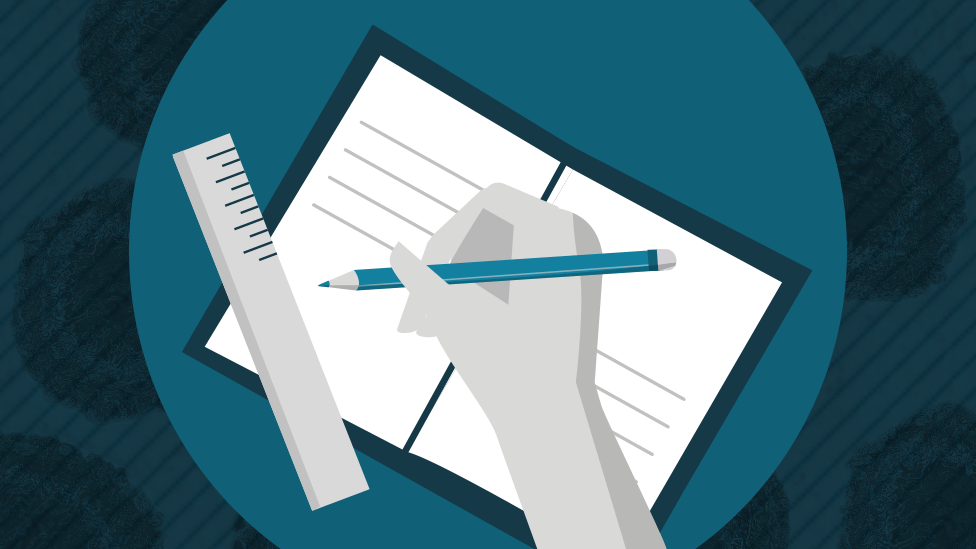
- Published12 May 2020
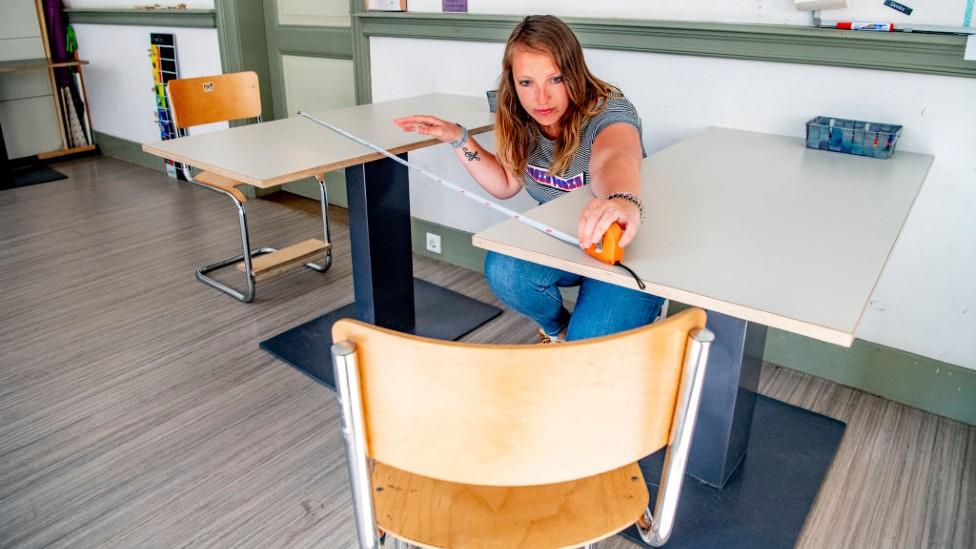
- Published7 March 2021
